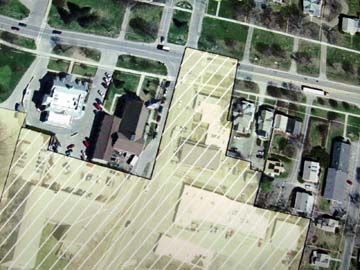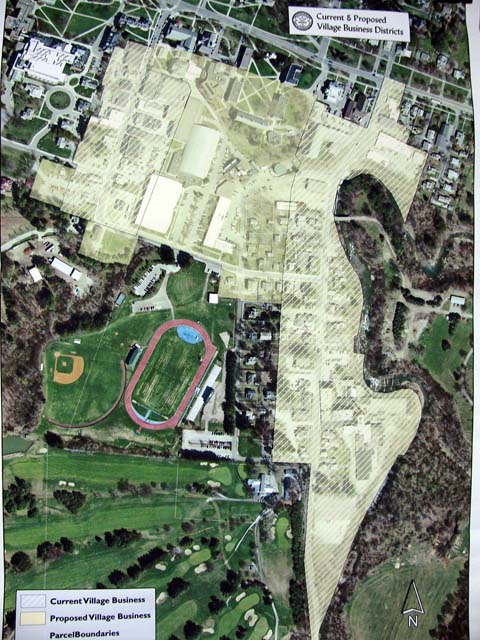
Williamstown Zoning Bylaw Goes to Public Hearing
 A village business district's jog across Main Street will be deleted from the final version; the boundary should be the south side of Main Street. The church and bank property to the left are zoned residential. |
The zoning bylaw amendment proposed by the Planning Board would extend the "village business district" to encompass the entire downtown, bordered by Spring, Latham, Water and Main streets while maintaining the "greenway" through the heart of the town. The new district layout would include college and other property between the Spring and Water streets not now in the plan.
Presented to the Selectmen two weeks ago, the plan is based on the town's master plan, said board Chairman Richard DeMayo. "We're looking at what the master plan wanted us to do to tighten it up and make it more viable for development."
The region includes the Spring Street parking lot and the section of the college between Spring and Water, and a long spearlike section south down Water Street to the Cable Mills project.
It does not, however, include the wide lawns along the south side of Main Street from Water to Spring streets nor the United Methodist Church, Williamstown Savings Bank and chunk of college property facing Main. Instead, the border of the business district cuts behind the buildings, which are zoned residential.
"We almost [included it] but the feeling of protecting our green ... you don't want your setbacks on the property line," said DeMayo. "This is a very important part of Williamstown."
The buildings on the east side of Water Street — which include Mezze, The Browns and Williamstown Realty — are already included in the business district.
Several selectmen questioned leaving out the church and savings bank property from the business district, saying it would open up possibilities for uses such as restaurants. Selectman Ronald Turbin said the church's future is in doubt and might be sold or put to other uses; its location in a residential district would limit its potential.
Planner Patrick Dunlavey, a cartographer who worked on the mapping of the district, said his board had discussed what might happen if the area was rezoned from residential. (The bank has a nonconforming use permit.)
"The concern that came about adding in the property for the bank and church is once you do that you're permitting a whole spectrum of uses in the area, some of which we might feel are appropriate in that town common and many that we might feel inappropriate," he said, raising the example of an adult bookstore. "If down the road there's a reason to rezone it. To open it now is pretty immature."
 The proposed village business district include all of the area between Spring and Water streets, the Spring Street parking lot and Cable Mills project on Water Street. The zoning is set far back from the south side of Main Street to preserve the village green. |
"You're conflicting with an important value of the town of williamstown," said Michael Card, director of inspection services. "Which is the originally laid out green of the town, which is the heart of the town."
The zoning would open up the area to different uses, such as multi-unit housing and higher buildings, he said. If you go to village business, it can to go the property line; now, the buildings have to set back 30 feet.
"I think that we have a very powerful public interest involved here — which is keeping the green as much as possible," said Card.
Town Manager Peter Fohlin said the planners' argument was persuasive. "I think the problem is the Methodist Church and bank are great accents and contributors to the town green."
What would happen, he asked, if the church became a dress shop, or liquor store or anything else allowed in a business district. "We have a potential to regret it."
The board complimented the planners on their work and unanimously recommended the changes.
The zoning change was approved at the 2009 town meeting.















